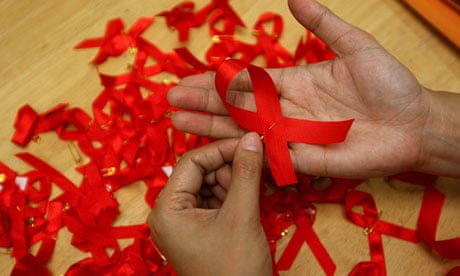How do you keep the crisis of HIV/Aids in the public eye? That's the dilemma among the agencies tasked with combating the disease. Aids is now a familiar story and they worry that attention has been shifting to other priorities, such as maternal health. Combine that with tightening government budgets and there is widespread anxiety that funding is falling sharply.
What is badly needed is evidence that HIV/Aids programmes are working. Many donors – particularly those in Washington and London – are putting great emphasis on value for money. They want evidence of results.
This is where the World Bank comes in. Last summer at the international conference on HIV/Aids in Vienna, the bank announced that two pilot projects in Tanzania and Malawi involving cash transfers had been very successful in reducing infection rates. My colleague Sarah Boseley wrote about the projects.
Now, to coincide with World Aids Day today, the World Bank is promoting these studies as evidence that "innovative HIV prevention strategies" can work, and there is a lot of interest. Cash transfers are attracting considerable attention – I wrote about how they work in Brazil recently. The World Bank describes on its website how in Malawi, girls were given cash transfers on condition they stayed in school. The idea was to reduce the "transactional sex" that exposes many young girls to infection from older men. There was a sharp drop of 60% in HIV infection rates.
But there is no detail here about the Tanzanian project, which followed a very different design.
In Tanzania 3,000 participants aged between 18 and 30 were enrolled in the project and were given cash payments on condition that they didn't undertake "risky sexual behaviour". If they tested positive for sexually transmitted infections this was judged as evidence of risky sexual behaviour and they lost the cash payment. It has led to a 25% fall in sexually transmitted infections. This was the proxy measure for the real aim of the project, which was HIV infections.
The concern raised by Dr Sophie Harman, of City University, is that the Tanzanian project poses serious ethical problems. It exacerbates the problems of stigma – already one of the biggest problems in tackling HIV/Aids. In the Tanzanian project, as soon as you have contracted a sexually transmitted disease, you have the added penalty of losing the cash transfer. It also distorts wider prevention programmes, undermining the ethics of personal responsibility and introducing a concept of financial incentive for doing what you should be doing anyway. Besides, there is another aspect to this: how sustainable can such programmes be? Do its benefits only last as long as the cash transfers, perhaps only a few years or even less?
Conditional cash transfers may have a role to play, argues Harman. In some projects they can work effectively, but the key issue is what is the conditionality? Staying on at school, as in the case of Malawi, works well, but Harman claims that Tanzania sets a dangerous precedent, confusing many messages about personal responsibility and sexual behaviour - quite apart from penalising the very people most likely to need medical help. She is worried that given the popularity of cash transfers and the urgent need to show results, there is a real danger of donors latching on to what can be a dangerous idea.

Comments (…)
Sign in or create your Guardian account to join the discussion